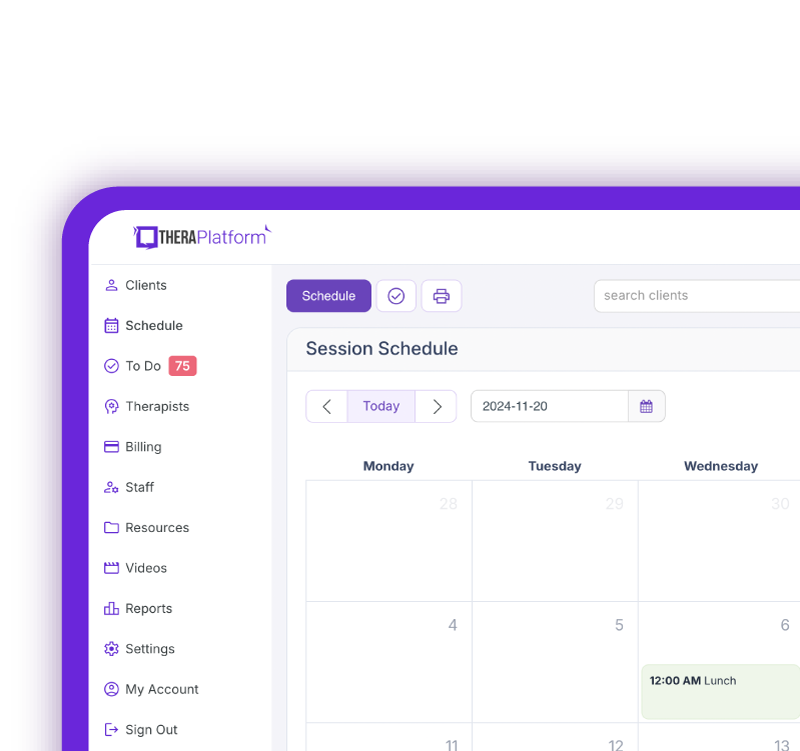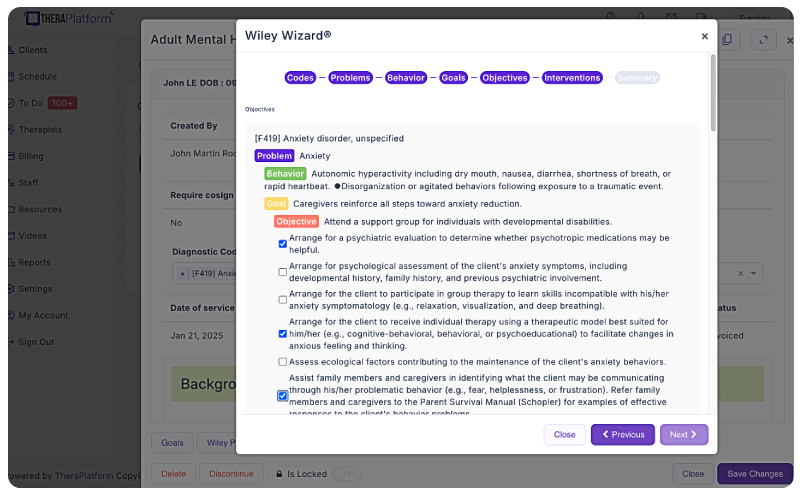Goals counseling

Counseling goals are not why most clinicians choose to be therapists. They’re not very sexy. They don't make a good story. But—let’s face it—there is no therapy without counseling goals.
People have problems and they come to therapy to improve themselves and their situation. That doesn’t happen if they have nothing to work towards. Besides, it is generally understood that making therapy goals is associated with positive treatment outcomes. At least when you do it correctly.
Summary
- Clear counseling goals give therapy direction, increase client motivation, set expectations, and are essential for demonstrating progress to clients and insurance companies.
- The blog highlights the SMART (Specific, Measurable, Achievable, Relevant, Time-bound) and GROW (Goal, Reality, Options, Will) models as structured frameworks to help therapists and clients create practical, results-oriented goals. Download my free SMART goals and GROW goals worksheets.
- Therapists are encouraged to prioritize goals, balance short- and long-term objectives, regularly monitor progress, and take time to develop goals that are realistic and client-driven.
- Platforms like TheraPlatform streamline goal creation and monitoring through features like goal libraries, integrated Wiley Treatment Planners, and visual progress tracking—saving time while improving care quality.
Streamline your practice with One EHR
- Scheduling
- Flexible notes
- Template library
- Billing & payments
- Insurance claims
- Client portal
- Telehealth
- E-fax

Why do we make therapy goals?
There is a long list of reasons to make therapy goals. Here are some of the most important:
Structure
Counseling goals give therapy a direction. Without clear objectives, sessions are more likely to be aimless and hinder the client’s progress. They keep you and the client focused on what’s important. Counseling goals are the roadmap for successful therapy.
Motivation
Creating goals is kind of like making a to-do list. You make a list because you need to get certain things done. And seeing those items written down motivates you to complete them. Therapy goals are a constant reminder that you need to work on yourself. And you can’t cross those counseling goals off your treatment plan unless you make the effort to address them.
Expectations
Establishing counseling goals lets the client (and therapist) know what to expect from the therapeutic process. They understand they will be working on specific issues and they have a reasonable target date to examine their progress. Uncertainty breeds anxiety. You want your clients to feel secure in what they are trying to accomplish by going to therapy.
Insurance
Clear and realistic therapy goals can help prevent insurance problems. Insurance companies want to see that clients are making progress in therapy. Clearly written therapy goals allow representatives to easily figure out client targets and if therapist interventions are working. If an insurance company can’t see what you are working towards, you may be audited.
Common therapy goals
Clients usually come to therapy to work on something specific. They want a particular outcome.
Examples include:
- Change a specific behavior, such as overeating or drug use.
- Develop new coping skills
- Improve decision-making
- Foster relationships
- Elevate mood
Whatever the reason you may have for setting a goal, creating specific areas to target is a crucial first step.
What makes an effective treatment goal?
Creating psychotherapy treatment goals can help clients improve their well-being but—when done poorly—it can also hinder progress. Two constructive ways to make a treatment counseling goal are the SMART and GROW techniques. First, the SMART template tells you exactly what you want to include in your psychotherapy goals.
SMART model for Therapy Goals
Specific
You want to make sure that the counseling goals you create are specific and easy to follow. They should not be too general. General therapy goals have too many facets to complete successfully. Counseling goals usually have objectives. Objectives are the specific actions the client will take to complete the goal. Sometimes creating objectives and deadlines is termed the “action plan”.
Measurable
You need a way to track your efforts. That is only possible when the goal is measurable. Both you and the client need to be able to simply monitor their progress. This also helps when you have to provide evidence to an insurance company as to why your client is still in treatment.
Achievable
Counseling goals need to be attainable or it will be counterproductive. Too easy of a goal, however, is not a goal worth having. It is best when it is challenging but achievable within a certain time frame. It also needs to be under your control. If you have to depend on someone else for its success, it is not an effective goal.
Relevant
Treatment goals should be aligned with the client’s values. If they don’t agree it is a meaningful goal that fits with their lifestyle, they won’t be motivated to follow through. Also remember, these are the client’s counseling goals and they need to have input in creating them.
Time-bound
Counseling goals need to have a reasonable deadline. The deadline can always be extended but it helps the client to stay motivated and make progress. It also shows the insurance company that you aren’t trying to continue therapy indefinitely.
Practice Management + EHR + Telehealth
Manage more in less time in your practice with TheraPlatform

GROW model for therapy goals
Another popular goal-setting tool is the GROW model. This technique acts as a guide for therapists to aid clients in thinking through the goal-setting process and its impact on their life. GROW stands for:
Goal
In this first step, you will help clients identify appropriate counseling goals for treatment.
Some questions to ask include:
Why do you want this goal?
- How will achieving this goal change your life?
- Are there any downsides to accomplishing this goal?
- How will you feel if you achieve this goal?
Reality
Therapy goals are not helpful if they aren’t grounded in reality.
A therapist needs to ask practical questions to make sure a goal is appropriate for treatment.
- Is this goal achievable?
- How does this goal fit into your current life?
- Have you attempted this goal before? What happened?
- What are you doing that might get in the way of this goal?
Options
This part of the process is designed to help the client examine the steps they need to take if they were to accomplish the goal.
Questions might include:
- What could be your first step in achieving this goal?
- Name three ways you might tackle this problem.
- Are there other ways you might accomplish it?
- What are some pros and cons of that option?
Will
The final step of the process focuses on a client’s commitment and motivation toward achieving the counseling goal.
The therapist asks the client to look forward to achieving the goal and what it might take to get there.
- What will you do this week to work on your goal?
- What obstacles might you encounter?
- What support do you need to get this done?
- On a scale of 1-10, how motivated are you to complete this goal?
Goal setting tools
Here are several other tools that will help clients conquer their goal-setting challenges.
- There are numerous workbooks on goal-setting. A quick internet search will turn up a boatload of helpful options. One of the most motivational is Brian Tracy’s Goals!: How to Get Everything You Want -- Faster Than You Ever Thought Possible
- We live in a digital age. There are several apps aimed at helping people achieve their counseling goals. One of the most comprehensive and user-friendly is Success Coach-Life Planner.
- Purdue University has a worksheet that covers the bases of goal-setting. It is a productive complement to therapy. Here is another helpful worksheet by TheraPlatform that uses the SMART framework for goal-setting.
- A popular goal-setting exercise is entitled the “Average Perfect Day”. This exercise asks clients to envision what they want a regular day in their life to look like. This exercise can also be extended in time. You can ask clients to describe what they want their life to look like a year from now.
- Journaling is another effective activity to help you keep track of your daily progress in meeting your counseling goals. Did you know that they even make journals specially designed to aid in goal achievement? One popular method that combines both writing and drawing is bullet journaling.
Free Resources for Therapists
Click below and help yourself to peer-created resources:

Goal-making tips for therapists
The following are helpful hints for therapists when creating treatment goals:
Wave the magic wand
Some clients are very clear about their counseling goals. Others, not so much. A good way to figure out psychotherapy goals is to ask the magic wand question: what would you change if you had a magic wand and could change five aspects of your life? Some of these ideas may be a bit outlandish but you can help the client make them more realistic. Besides figuring out what a client wants to work on, it is also important to understand what is preventing them from making those changes.
Prioritize
A client may have 10 areas they want to work on but it may not be realistic to complete them all in the foreseeable future. You need to help them decide which counseling goals are most important and should be worked on first. When making a treatment plan you don’t want to have too many counseling goals. That only makes it less likely you will complete them.
Long or short-term?
Some counseling goals you will want to complete in the next five months and some you may want to complete in five years. While it is valuable to always keep long-term therapy goals in mind, treatment is primarily meant to focus on what you are doing in the present and immediate future. Keep in mind, however, that some short-term therapy goals may contribute to larger counseling goals. For example, maybe an immediate goal is to decrease particular anxiety symptoms. And doing that will help your client achieve the long-term goal of finding a romantic life partner.
Regularly monitor counseling goals
Even when a goal has a set deadline, it is important to have checkpoints along the way. Make clear to your clients that the date of the deadline is not the only time you will be assessing their progress. It is also helpful to share how you will be monitoring their improvement. You can document progress of their therapy goals in your progress notes.
Take your time
Take at least a few sessions to set counseling goals. There is pressure to make therapy goals right away, especially when you want to make a diagnosis for insurance purposes. But let’s face it, you can’t know what is going on with a client in one session. Issues usually unfold over time. The great thing about counseling goals (and treatment plans) is that you can update them as necessary.
Limit your goals
Don’t focus on too many objectives at once. Just as you don’t want to overload your client with counseling goals, you don’t want to saddle them with ten objectives at one time. Keep in mind that you can have objectives in reserve. Once an objective is concluded, you can replace it with another that they need to complete to accomplish their goal.
Make realistic deadlines
Set a deadline but allow sufficient time. As we mentioned, deadlines are important. But, when they are set unrealistically, they can be detrimental. It is crucial to give the client enough time to complete their therapy goals in a manageable way. On the flip side, giving too much time will sap their motivation.
Examples of psychotherapy treatment goals
Here are three examples of well-written therapy goals in common treatment areas:
1) Substance Abuse
Goal: Build a healthy support system to aid in recovery from opioid abuse
Objectives:
- The client will make contact with friends and/or family three times a week
- The client will attend Narcotics Anonymous (NA) three times a week
- The client will get a sponsor within a month
2) Anger Management
Goal: Develop effective anger management techniques
Objectives:
- The client will walk away from situations that trigger strong emotions
- Learn three positive anger management skills and practice one daily
- Learn two ways to communicate verbally when angry
3) Depression
Goal: Decrease symptoms of depression through improved coping
Objectives
- Learn three coping techniques to reduce depression and practice one each day
- Complete CBT thought record daily
- Identify three past ways of coping with depression that have not worked for you
Technologies supporting counseling and therapy goals
Well-thought-out therapy goals are integral to any treatment plan. They set expectations for the client and act as a motivating guide to successful outcomes. Without goals, therapy would be a rudderless exercise in futility. But what happens if you don’t have an efficient way to monitor therapy goals for all your clients? You are likely to become confused and overwhelmed. Luckily, Theraplatform has exactly what you need.
Theraplatform is a comprehensive practice management and telehealth platform for mental health and medical providers. It includes an electronic health record (EHR) system with a library of templates for progress notes and treatment plans that can be modified according to your needs. This system allows one to enter therapy goals and monitor them after each session. What’s more, it links your goals to your therapy notes and allows you to “score” a client’s progress. Scored therapy goals are also represented in graphs so you can visually see the client’s progress on each goal over time.
TheraPlatform can help you save time on writing your counseling and therapy goals with their multiple features built into their EMR, practice management and teletherapy all-in-one software:
- Your personal bank of goals, objectives and interventions
TheraPlatform automatically saves a new goal, objective and intervention you type so you don’t have to re-type the same goal, objective or intervention. Simply look up the goals, objectives and interventions you previously entered for every client.
- Library of Assessment, treatment plans and other therapy notes
To streamline your counseling goals and assessments, TheraPlatform offers a built-in library of assessments and treatment plans, therapy notes. These can be modified and therapists and counselors can build any template from scratch with TheraPlatform’s form builder.
- Goal monitoring
This system allows one to enter therapy goals and monitor them after each session. What’s more, it links your goals to your therapy notes and allows you to “score” a client’s progress. Scored therapy goals are also represented in graphs so you can visually see the client’s progress on each goal over time.
Additional tools to help with data collection and progress monitoring

Therapists can also take advantage of EHRs (such as TheraPlatfrom) that offer integrations with Wiley treatment planners to ensure consistent data collection on progress from session to session. The best part about partnering with a modern EHR is the time you save on formulating the actual notes and scoring.
What is Wiley Treatment Planner?
Wiley Treatment Planner is a widely used clinical resource designed to help mental health professionals and other therapists efficiently create treatment plans for their clients. In addition to treatment plans, the company also provides prewritten therapy notes for some diagnostic codes. It is part of the "PracticePlanners" series published by Wiley.
Features of Wiley Treatment Planner includes:
- Prewritten, evidence-based treatment goals, objectives, and interventions
- Treatment planners tailored to specific populations and problems, including adults, children, adolescents, couples, families, addictions, and more
- Alignment with the diagnostic criteria from the DSM-5 and ICD-10
- Prewritten therapy notes
Is there an online version of Wiley Treatment Planner and how can I get the Wiley Treatment Planner?
Wiley Treatment Planner company partnered with a select number of EHRs for mental health providers to make treatment planners available online. TheraPlatform’s EHR offers the Wiley Treatment Planner as an add-on for both assessment and treatment plans and therapy notes, such as notes. You can edit prewritten notes and add your own with any therapy template on TheraPlatform.
Streamline your practice with One EHR
- Scheduling
- Flexible notes
- Template library
- Billing & payments
- Insurance claims
- Client portal
- Telehealth
- E-fax

Resources
Theraplatform is an all-in-one EHR, practice management and teletherapy solution that allows you to focus more on patient care. With a 30-day free trial, you have the opportunity to experience Theraplatform for yourself with no credit card required. Cancel anytime. They also support different industries including mental and behavioral health therapists in group practices and solo practices.



